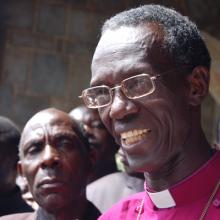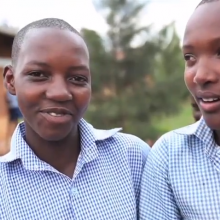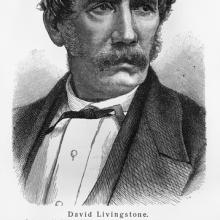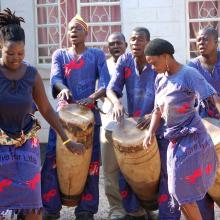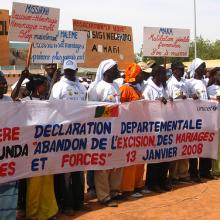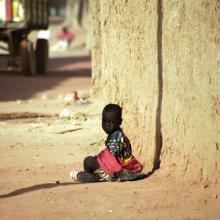Africa
In the last month, many Westerners watched in horror as Uganda, and then Nigeria, enacted laws that are brutally repressive to lesbian, gay, bisexual, and transgender people.
The fate of a bill passed by the Ugandan parliament remains uncertain after President Yoweri Museveni refused to sign it, but news reports from Nigeria indicate that there have been mass arrests of gay men following President Goodluck Jonathan’s signing of the National Assembly’s anti-gay bill.
World leaders, including United Nations Secretary-General Ban Ki-moon and U.S. Secretary of State John Kerry, have expressed their dismay. Many Christian leaders around the world, regrettably, have been largely unwilling to criticize Christian leaders in Africa who cheered the passage of these punitive laws.
We are making historic progress against HIV/AIDS: The global rate of new HIV infections has leveled, and the number of annual AIDS deaths has decreased by nearly a third since 2005. Antiretroviral drugs are driving these gains by stopping progression of the disease and, we now know, preventing the spread of HIV infections.
Yet AIDS remains the leading cause of death in sub-Saharan Africa, where poverty limits access to lifesaving treatments and 25 million people are living with HIV—representing 70 percent of cases worldwide. President Barack Obama should be commended for uniting the world behind the goal of creating an AIDS-free generation. I share his passion and believe we can achieve this in the next decade — but only if we accelerate the provision of antiretrovirals to the poorest and most vulnerable people.
The opportunity has never been clearer. New data published in the New England Journal of Medicine project that early treatment with antiretrovirals in South Africa, my home country, would prove very cost-effective over a lifetime (costing $590 per life-year saved) and generate both public health and economic benefits. The World Health Organization now recommends early and preventive treatment with antiretrovirals, including administration to children and uninfected partners of people living with the disease. The WHO estimates that this could save an additional 3 million lives and prevent at least as many new HIV infections through 2025.
When Obama and I met in South Africa in June, I reminded him that, given his deep familial roots in the continent, his success is our success — his failure, our failure. With that in mind, there are two decisions Obama can make before the end of this year to fulfill the promise of an AIDS-free generation.
Concerned that the crisis in the worldwide Anglican Communion is deepening, conservative Anglican primates in Africa are organizing a second conference to discuss ways of returning the church to what they describe as biblical faithfulness.
The primates held the first conference in Jerusalem in 2008, five years after openly gay New Hampshire Bishop Gene Robinson was consecrated in the Episcopal Church. The action threw the communion into disarray.
At the Jerusalem meeting, the primates called for the creation of an Anglican province in North America to rival the Episcopal Church. Five years later, the primates say the new Anglican province, known as the Anglican Church in North America, is thriving.
In some African countries, tribes have shunned circumcision because it was seen as a Muslim practice or was simply considered primitive.
“We thought they were born differently and had to reconfigure the way they were,” said African Chief Jonathan Eshiloni Mumena.
So the tribal chief was not prepared for his son’s declaration that he wanted to get circumcised.
Religious leaders in Africa strongly rebuked President Obama’s call to decriminalize homosexuality, suggesting it’s the reason why he received a less-than-warm welcome during a recent trip to the continent.
In a news conference in Senegal during his three-nation tour, just as the U.S. Supreme Court struck down a federal ban on same-sex marriage, Obama said African nations must grant equal protection to all people regardless of their sexual orientation.
“My basic view is that regardless of race, regardless of religion, regardless of gender, regardless of sexual orientation, when it comes to how the law treats you, how the state treats you … people should be treated equally,” Obama said. “And that’s a principle that I think applies universally.”
Look for a billboard on the right and a sign on your left. There’s a dirt road. Turn there.
In this part of the world, most of the streets have no names. So the directions we were given to find the new compound where my son’s Malawian relatives relocated a few months earlier were pretty specific given the circumstances.
We had hoped to be able to visit with Vasco’s 16-year-old half-brother, Juma, his Aunt Esme, and a handful of cousins and other relations for a couple of hours. By the time we found the family’s new compound, we had less than an hour before we had to get back on the road, meet the rest of our traveling companions, and head north before the sun fell.
I was heartbroken. But when we pulled up in our van, Vasco’s relatives were so happy to see us (and vice versa) that even the woefully short visit felt richly blessed. It had been three years since we’d seen each other. The last time was in May 2010 when Vasco, my husband, and I traveled from California to Blantyre for our adoption hearing. We spent a month in Blantyre and were able to get to know Vasco’s extended family (or, sadly, what remains of it) and begin piecing together our son’s complicated biography.
Since our last visit, Vasco, now 13, has grown about a foot and then some. He’s also traded his close-cropped “Obama cut” for Bob Marley-esque locks. Vasco wasn’t the only one who’d changed – visibly and otherwise.
Malawi is one of the poorest countries on the planet, with more than 9 million people living on about $1.25 a day. HIV/AIDS, which we believe claimed the lives of Vasco’s birth parents before he would have entered kindergarten, remains a critical health issue. Among 15- to 49-year-olds, the HIV/AIDS rate hovers above 10 percent despite widespread efforts to combat the fully preventable disease.
Malaria, tuberculosis, and diarrhea-related fatalities remain high in Malawi. So does unemployment, particularly among younger workers in urban areas such as Blantyre, where it is approximately 70 percent.
According to UNICEF, 29,000 children under the age of five – 21 each minute – die every day, mainly from preventable diseases.
The GAVI Alliance, a public-private partnership aimed at increasing worldwide access to immunizations, has a goal of reaching 250 million children by 2015. Dr. Mercy Ahun, GAVI special representative in Geneva, sat down with Sojourners to discuss the role of faith-based organizations in helping reach those 250 million,and the role her own personal faith plays in her work.
“What really got me into public health is my time in the children’s wards. We were working with children who had preventable diseases,” Ahun said. “… I thought to myself, why should stay here waiting for the children to fall sick before they come to the hospital. It’s better actually to go out there and prevent this in the first place.”
While many people continue to believe there is no climate crisis, those most affected by global warming—particularly in the global South—know otherwise. According to Sojourners magazine’s interview with Malawi activist Victor Mughogho, the “impacts are quite severe on the ground.”
FOR MANY IN the global South, climate change is not an abstract theory. Victor Mughogho, executive director of the Eagles Relief and Development Programme in the southeast African country of Malawi, has experienced firsthand the toll of global warming and extreme weather. He works with local churches to develop practical and faithful solutions to mitigate the effects of climate change. Sojourners assistant editor Elaina Ramsey interviewed Mughogho early last year when he visited Washington, D.C.
Elaina Ramsey: How has climate change affected the people of Malawi?
Victor Mughogho: The impacts are quite severe on the ground. Rural people in Malawi constitute about 85 percent of the population. These people are subsistence farmers. For them, rainfall is everything. Without the rain, there's no agriculture, no livelihood.
The weather patterns have changed and are so unpredictable now. In the past 20 years, official records from the government show that we've had five severe droughts. Because of the cycles of drought, there is less and less water in the ground. The water table is sinking. Trees and grass are stunting and rivers are drying up.
If you asked a person "What will happen in the next 10 or 20 years?" they'd say that what's bad now, in retrospect, is going to look like a good time. It looks like worse times are coming ahead.
While the drone debate continues to grow, the administration is moving to expand their use. According to the Washington Post, the U.S. Air Force began flying surveillance drones from a base in Niger late last month.
“Since taking office in 2009, President Obama has relied heavily on drones for operations, both declared and covert, in Afghanistan, Iraq, Pakistan, Yemen, Libya and Somalia. U.S. drones also fly from allied bases in Turkey, Italy, Saudi Arabia, Qatar, the United Arab Emirates and the Philippines.
“Now, they are becoming a fixture in Africa. The U.S. military has built a major drone hub in Djibouti, on the Horn of Africa, and flies unarmed Reaper drones from Ethiopia. Until recently, it conducted reconnaissance flights over East Africa from the island nation of the Seychelles.
“The Predator drones in Niger, a landlocked and dirt-poor country, give the Pentagon a strategic foothold in West Africa.”
At this point, the primary objective from the new base is the fight against an Islamic insurgency in Mali, intelligence information from the drones is shared with French and African troops involved.
LONDON — When journalist Henry Morton Stanley found the world’s most famous missionary barely alive at the tiny village of Ujiji on the shores of Lake Tanganyika on Nov. 10, 1871, he gave the English language one of its most famous introductions: “Dr. Livingstone, I presume?”
As Britain marks David Livingstone’s 200th birthday on Tuesday, Christians are being reintroduced to one of the greatest missionaries and explorers of the 19th century. A new book, meanwhile, introduces a darker side to Livingstone’s globe-trotting career and the corrosive effect it had on his marriage.
That 1871 meeting in the heart of Africa is the stuff of legend.
In 1864, Livingstone — already one of the world’s most famous men because of his trek across Africa and the 1855 “discovery” of the Victoria Falls that straddles modern-day Zambia and Zimbabwe — mounted an expedition to discover the source of the Nile River.
As months stretched into years, nothing was heard from the famed explorer.
With a short note to the Congressional leadership, President Barack Obama announced last week that a total of 100 U.S. troops are now in Niger to “provide support for intelligence collection and will also facilitate intelligence sharing with French forces conducting operations in Mali.”
“A U.S. defense official, speaking on the condition of anonymity to provide details about military operations, said that the 40 troops who arrived in Niger on Wednesday were almost all Air Force personnel and that their mission was to support drone flights.
“The official said drone flights were “imminent” but declined to say whether unarmed, unmanned Predator aircraft had arrived in Niger or how many would be deployed there.”
The Predator drones will be unarmed and carry out surveillance missions. But The Post noted that theadministration had not ruled out arming the Predators with missiles in the future.
The New York Times reports that the U.S. is preparing to establish a base in northwest Africa so that it can fly drone surveillance missions against the local affiliate of Al Qaeda and other Islamist extremist groups.
“For now, officials say they envision flying only unarmed surveillance drones from the base, though they have not ruled out conducting missile strikes at some point if the threat worsens. …
“A handful of unarmed Predator drones would carry out surveillance missions in the region and fill a desperate need for more detailed information on a range of regional threats, including militants in Mali and the unabated flow of fighters and weapons from Libya. American military commanders and intelligence analysts complain that such information has been sorely lacking.”
This morning, Reuters reports that Niger has given permission for the drones to be based in that country. According to a “senior government source,” the U.S. Ambassador to Niger made to the request to the country’s president, who accepted it.
On my desk, next to my laptop, is a can of seltzer water. My grapefruit-flavored, bubbly water sits about four inches away from my left hand as I write. When the can is empty, I might take another from the fridge or fill up a water bottle at the kitchen sink.
Water drives my day, but I rarely think about it. I cook pasta in it. I heat water to make tea. I fill a bucket to mop the floor and a draw a bath with hot water and soak in it. At the moment, my dishwasher is growling away, and I’m waiting to hear the pleasant beep that alerts me that the clothes in the washer downstairs are clean.
I’ve never considered water a women’s issue. Not until this past week, that is. On Friday, the day before World AIDS Day 2012, I had the privilege of attending World Vision’s Strong Women, Strong World luncheon in New York City. Strong Women, Strong World is a new initiative “supporting sustainable change in some of the difficult places in the world to be a girl or a woman.” The focus of the day was water.
The Honorable Melanne Verveer, U.S. Ambassador at-large for Global Women’s Issues, spoke at the event. She celebrated the progress humanitarian organizations such as World Vision have made in the effort to eradicate HIV/AIDS, but reminded us that the number of people living with HIV is at an all-time high. In 2010, HIV/AIDS killed 1.8 million people. Sixty percent of those living with HIV are girls and women, and AIDS is the leading cause of death of women of reproductive age (15-44 years old) globally.
“HIV,” Ambassador Verveer said, “has the face of a woman.”
As people of faith, it is not uncommon to pray for miracles when faced with overwhelming obstacles. For many of us, AIDS has been one of those mind-boggling, heart-wrenching causes that has wreaked havoc on the world and been the subject of many prayers.
Since the early days of the disease, the focus has been on a cure. Researchers worked tirelessly for it and the faithful asked God to provide it. But the cure has never come.
And yet, as we mark another AIDS Day this Saturday, Dec. 1, there is evidence of the miraculous.
After 24 years of commemorating this day with grim statistics and little hope, there is finally good news.
Millions of people are receiving treatment. Many fewer people are dying.
The new infection rate has dropped by 50 percent or more in 25 countries since 2001. With access to treatment, being HIV-positive is now considered a chronic disease, not a fatal one.
Kenyan church leaders are lining up in opposition to proposed new marriage bills, which they say will weaken marriage by allowing cohabiting couples to register as married.
One bill would bring Christian, Hindu, Muslim, civil, and customary marriages under one law, and another would give spouses and children more rights to property. The twin bills were approved by the cabinet on Nov. 9 and are scheduled to be debated by Parliament before Christmas.
“It is the worst law we have had as churches in Kenya. It compromises the standards of Christian marriage and divorce. Instead of three grounds for divorce, we now have nine,” said the Rev. Wellington Mutiso, the general secretary of the Evangelical Alliance of Kenya.
"Do you think he'll sing?" the girl in the row behind me wondered aloud.
"I hope so," the young fellow beside her said before continuing, "My dad would freak. He was a big fan of U2 when I was growing up. He used to play this one album, The Joshua Tree, over and over again."
His father was a fan.
I am a thousand years old, I thought to myself, as more Georgetown students filled the seats around me at the university's 111-year-old Gaston Hall, the main lecture hall on campus named after Georgetown's first student, William Gaston, who later served as a member of the U.S. Congress.
The hall, decorated with stunning art-deco-era frescos and the crest of every Jesuit institute of higher learning, has hosted many dignitaries over the years, including Presidents Obama and Clinton, Vice-President Al Gore, Secretary of State Hillary Rodham Clinton, and Supreme Court Justice Antonin Scalia, to name but a few.
"So if he's not going to sing, is he just going to talk," another student asked, with a distinct whiff of disappointment in his voice.
"I hear he's an awesome speaker, though," still another student said.
The students who packed the auditorium, many of them from Georgetown's Global Social Enterprise Initiative at the McDonough School of Business and more than a few donning black t-shirts with the insignia of the ONE Campaign (of which Bono is a co-founder), weren't sure what to expect from the famous Irish rock star and humanitarian.
A concert? A lecture? Another boring speech?
I'm fairly certain none of the students present for Monday night's event, sponsored by the Bank of America and The Atlantic magazine, anticipated hearing Bono, the 52-year-old lead singer of U2, preach.
But preach he did.
BOSTON -- The one thing that Afrah Farah will tell you about her genital cutting experience is that it happened. She doesn’t want to say how old she was, where it happened, or who was or wasn't with her.
Yet, despite the painful memories that the experience evokes and her concerns about people's reactions, Farah, said she knows she has to speak out.
“It’s basically a traumatizing experience. It’s traumatizing for every young girl that goes through that. It’s something that sticks in your memory, and physically,” said Farah, a Somali immigrant who came to the Boston area by way of Kuwait and Germany in 2007, and now works as a drug developer in a Massachusetts laboratory.
“There are millions of people who are affiliated with this procedure -- parents, grandparents, people in the community -- and to label them all as bad people or barbaric, that’s wrong. You will push them away. To solve a problem like this, you need to approach people with respect.”
Because of its severity and prevalence, female genital mutilation (FGM, or "cutting") is arguably one of the most important human rights issues in the world. It’s also become increasingly important in the U.S. as the number of immigrants from countries where it is practiced grows.
NAIROBI, Kenya -- Church leaders are pressing the Kenyan government to scientifically test herbal medicines that are used by millions to manage and treat diseases, saying the nontraditional therapies could be putting patients' health at risk.
The leaders say HIV/AIDS patients and others suffering chronic conditions are widely using the medicines, whose efficacy is unknown.
Peacemaking happens in many forms. Sometimes peace is offered to others, and sometimes given in unexpected ways.
It was early morning. The African sun had yet to rise above the mountains, and the sky was the soft yellow of newly shucked corn.
“Beep, beep,” sounded the horn on the old truck as it rumbled to a stop in front of my house. My old friends – Momadu, Madu, and Balamusa – greeted me with smiles, waves, and morning blessings.
We were on our way from Kenieba, a small town in western Mali, to Sitaxoto, a large village about two hours away over a broken dirt road.
A church was there, a little group of people who met each week outside under a big baobab tree to pray, study the Bible, share their stories and ask, “How do we follow Jesus?”


